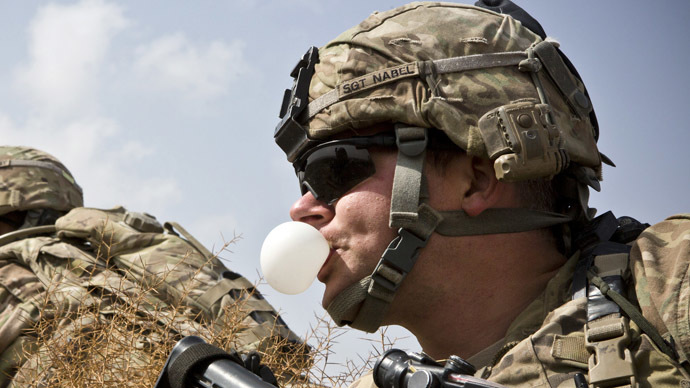Pentagon developing combat chewing gum

Maintaining good dental health may not seem like it’d be a top priority for soldiers, but the US military is hard at work developing a new kind of chewing gum that can battle cavities.
Simply dubbed “Combat Gum,” the new product is currently under development at the Army Institute of Surgical Research. Featuring a synthetic collection of anti-microbial peptide – the same naturally-occurring molecules in human saliva that kill bacteria – the gum can potentially help reduce plaque and tooth decay, as well as prevent cavities.
The gum has been in development for roughly seven years, and after that much time and up to $12 million spent, the New Yorker is reporting it’s finally entered a testing phase that will last throughout the year. Not many people have tried the gum so far, but according to Domenick Zero, the director of the Indiana University School of Dentistry’s Oral Health Research Institute, the first set of human trials has been completed and "everything is going well."
Although Zero mentioned “this is not intended to replace tooth brushing,” he told the New Yorker that the gum could reinforce the mouth’s resistance and “prevent pathogens from colonizing our skin, or our mouths, or our defenses.”
Still, if the Combat Gum is effective, at $2 a piece it could potentially save the military a significant amount of cash. The armed forces spend more than $100 million every year on dental procedures, some of which require shouldering the burden of transporting a soldier to another continent for emergency services. According to Colonel Robert Hale, the commander of the Army’s Dental and Trauma Research Detachment, 40 percent of recruits have at least three cavities.
"Oral health is essential to warriors on the battlefield and could potentially save the military countless hours and dollars in dental health,” he told the Army Times in a January report. “[And] it would save a lifetime of dental disease for a significant population."
Originally intended for soldiers serving in territories lacking water, the Army is now looking to give the gum to those it considers to be high-risk soldiers, who make up 15 percent of all troops. That includes those with multiple cavities and anyone with decaying teeth.
Beyond that, however, there are also preliminary plans to bring the product to the consumer market, much like nicotine gum.
“If we can develop an anti-plaque chewing gum and offer it to a company like, I don’t know, Wrigley’s, and distribute that to the general population, then those kids will come and join the Armed Forces with less dental decay issues,” Hale said.














